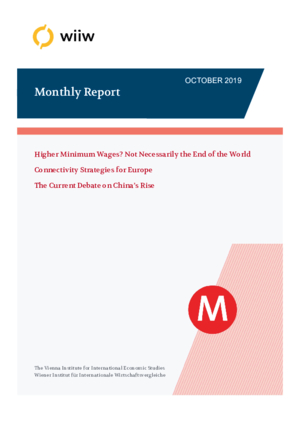Monthly Report No. 10/2019
Richard Grieveson, Julia Grübler, Sebastian Petric and Leon Podkaminer
wiiw Monthly Report No. 10, October 2019
42 pages including 29 Figures
- Chart of the month: 30 years of transition and convergence in CESEE
by Richard Grieveson
- Opinion Corner: Higher Minimum Wages? Not Necessarily the End of the World
by Leon Podkaminer
In September the Polish government announced a sharp increase in the minimum wage. For most economists this spells trouble. However, it is suggested that a similar wage hike administered in Hungary back in 2000 did not have the feared consequences in terms of inflation, unemployment, economic growth, and the profit share.
- Connectivity Strategies for Europe
by Julia Grübler
Within six years, China’s Belt and Road Initiative (BRI) has become a global project, anchored in its strategy to open and modernise its economy. In Europe, the Balkan region could profit the most from infrastructure development, in particular if the EU manages to optimise the complementarity between Chinese and European infrastructure investment plans.
- The Current Debate on China’s Rise
by Sebastian Petric
The recent increase in tensions between the United States and China, foremost with respect to their trade relations, is a sign of the fear that the rise of China entails. China’s peaceful rise over the last decades is not a guarantee that this will continue to be the case in the future. This article describes the different dimensions of China’s rise and gives the reader a detailed account of the current debate on the nation’s emergence.
- Monthly and quarterly statistics for Central, East and Southeast Europe
Reference to wiiw databases: wiiw Annual Database, wiiw Monthly Database
Keywords: economic transition, convergence, minimum wage, inflation, unemployment, profit share, infrastructure investment, Belt and Road Initiative, connectivity, long-term economic growth, power balance, Thucydides Trap
Countries covered: CESEE, China, European Union, Germany, Hungary, Poland, USA, Western Balkans
Research Areas: Macroeconomic Analysis and Policy, International Trade, Competitiveness and FDI
